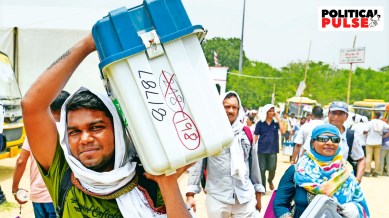In Uttar Pradesh, NDA in for a fight in over two dozen constituencies
Of the 27 such constituencies in west, central, and east UP where close contests are expected, 20 are currently held by BJP and allies

As voting concludes in the Lok Sabha elections on Saturday, one of the crucial states in focus will be Uttar Pradesh. The outcome in UP will be key to the “400 paar” target the BJP has set for the NDA’s return.
But the ruling alliance appears to be in a close fight in at least 27 constituencies – in west, central, and east UP – of which 20 are among the 64 seats that the NDA won in 2019. The reasons for this vary from local sentiments against sitting MPs, caste equations, and the choice of candidates of the Opposition INDIA bloc.
monthly limit of free stories.
with an Express account.
The 20 constituencies that the NDA currently holds and where it faces a tough fight from the INDIA bloc are: Ayodhya, Chandauli, Bansgaon, Kheri, Pratapgarh, Kairana, Aligarh, Fatehpur Sikri, Firozabad, Pilibhit, Mohanlalganj, Amethi, Kannauj, Kaushambi, Allahabad, Barabanki, Basti, Sant Kabir Nagar, Azamgarh, and Badaun. Of these constituencies, the ruling alliance changed candidates in Pilibhit, Barabanki, Firozabad, Allahabad, Robertsganj, and Badaun.
According to local BJP leaders, candidates in constituencies such as Ayodhya, Amethi, Kheri, Azamgarh, Kaushambi, Fatehpur Sikri, and Pratapgarh have also had to deal with their own workers. “They listened to only a few of their close aides,” said a state BJP leader who did not wish to be named.
State BJP spokesperson Rakesh Tripathi said, “We have a close fight in around 11 seats such as Kannauj, Azamgarh, Badaun, Ghazipur, and Ghosi, but we will come out victorious. Three to four rounds of counting (on results day) will clear the picture.”
The most common complaint against most of these MPs is that they were not as visible in their constituency as voters and workers wished or did not venture out of the district headquarters and met only the local administration. Some BJP leaders complained that often the party’s district office-bearers did not get appointments to meet the MPs and their representatives did not attend to problems and complaints.
For instance, in Ayodhya, which voted in the fifth phase on May 20, there was some discontent against two-time Faizabad MP Lallu Singh over the demolition of homes and shops because of the widening of roads and beautification projects underway in the city. In contrast, SP candidate Awadhesh Prasad, who is from the Dalit community, is known for being accessible to people – all these factors have combined to put the BJP in a somewhat uneasy spot despite the Ram Temple factor.
Kaushal Kishore (Mohanlalganj) and Rajkumar Chahar (Fatehpur Sikri) are also facing tough contests amid discontent among party workers over accessibility complaints.
In constituencies such as Pilibhit, Allahabad, Barabanki and Firozabad, the BJP changed candidates as the SP, in alliance with the Congress, strategically fielded candidates based on local caste equations.
In Allahabad, which voted in the sixth phase on May 25, the BJP replaced veteran leader Rita Bahuguna Joshi with senior leader Kesarinath Tripathi’s son Neeraj who was a government lawyer and is a political newbie. In contrast, former SP MLA Ujjawal Raman who is the son of Rewati Raman Singh, one of the party’s founders, contested on a Congress ticket and will be hoping that the Opposition bloc consolidated the votes of Muslims, OBCs, including Yadavs and Pals, and Dalits in numbers enough to cancel out the BJP’s support among Brahmins and other upper castes.
Among the seven constituencies that the BJP lost last time but is facing a close contest this time are Ghosi and Ghazipur, both of which vote on Saturday. In both these constituencies, the death of gangster-turned-politician Mukhtar Ansari, who was known to have played a crucial role in the BSP’s victories from here last time, is a crucial factor and may work for the INDIA bloc. Mukhtar’s brother and sitting MP Afzal Ansari is contesting from Ghazipur on an SP ticket while Rajiv Rai is contesting on the SP symbol from Ghosi against NDA ally and Suheldev Bharatiya Samaj Party (SBSP) chief Om Prakash Rajbhar’s son Arvind.
The other constituencies in this category are Ambedkar Nagar, Amroha, Lalganj, Saharanpur, and Shrawasti.
Congress gets SP support
Meanwhile, the Congress is in a direct fight with the BJP in at least seven of the 17 constituencies that it is contesting in UP, with party insiders hoping that with the SP’s help, it will turn them into close contests.
The Congress received a much-needed boost from the SP during the campaigning. While in the initial phases, SP chief Akhilesh Yadav and Congress leader Rahul Gandhi addressed just one joint meeting in support of a Congress candidate — Danish Ali in Amroha — as the election moved towards east UP, Akhilesh addressed 10 rallies for Congress candidates.
“The SP alliance this time has given us additional push in many seats. Apart from Rae Bareli and Amethi, these include seats such as Barabanki, Saharanpur, Fatehpur Sikri, Sitapur, and Kanpur,” a UP Congress leader said.